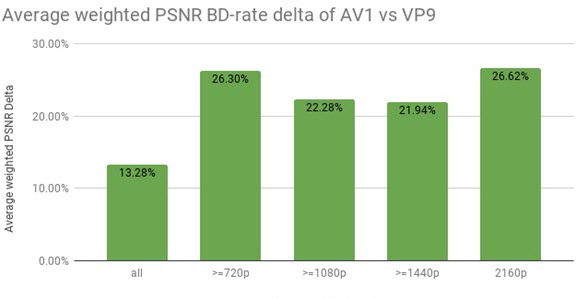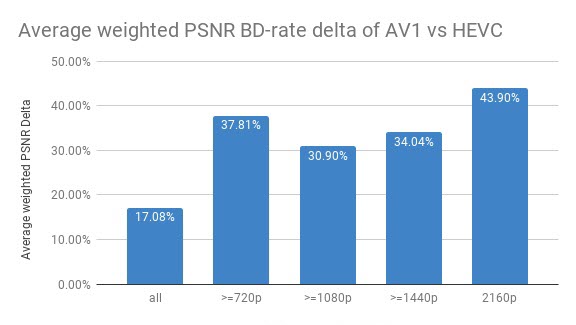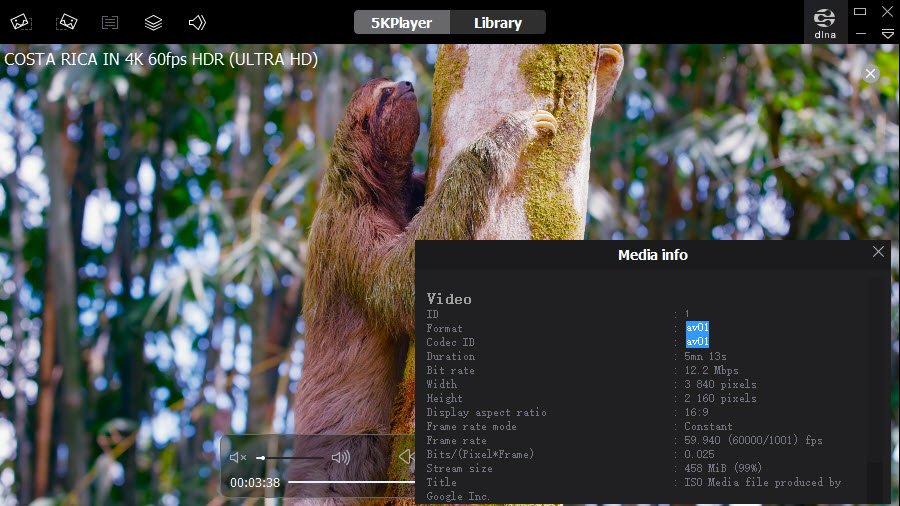
In-Depth Analysis of AOMedia's Next-Generation AV1 Video Encoding Technology

In-Depth Analysis of AOMedia’s Next-Generation AV1 Video Encoding Technology
5KPlayer > Video Music Player > AV1 Codec
Disclaimer: This post includes affiliate links
If you click on a link and make a purchase, I may receive a commission at no extra cost to you.
Everything about AV1 Video Codec - Updating
Posted by Kaylee Wood | Last update: September 30, 2020 | 5 Min Read
With flying news about AV1 codec, you may wonder what this kind of thing is. AV1, the royalty-free and brand new video encoding and decoding standard, is designed to supersede Google’s VP9 and replace HEVC codec, and aims to dominate the video compression field in the near future. To give all-round knowledge, this article will detail the information about AV1 video codec. And the story starts with AOM (Alliance for Open Media).
Latest news: NVIDIA’s GeForce RTX™ 30 Series GPUs has added AV1 hardware decoding support, Windows 10 will get AV1 Hardware-accelerated video support this fall and AMD RX 6000 Series GPUs will also support the AV1 Codec.
Main Contents:
1. Wiki: What is AV1 Codec?
2. Why AV1 is Needed?
3. AV1 vs. VP9 vs. HEVC
4. What Supports AV1 Video Codec?
5. How to Download AV1 Video Codec?
What is AV1 Codec?
AV1 – The Next Generation Video Compression Technology
AV1 video codec, based on Google’s VP9 and VP10 codec, is an open-source and royalty-free video coding format designed to bring higher compression rate to UHD 4K, HDR and even 8K videos, thus to allow you to enjoy highly-compressed videos with unstable connections, no quality loss, fast and easily. The aim of AV1 codec in compression rate is to reach 50% better than VP9 and HEVC, and finally replace them in market. In AV1 video format, any videos including higher bite rate, wider color range and better frame rate 4K 60fps/8K videos will be transmitted over the internet and played fluently. Better still, it also supports faster and smoother live streaming.
AOMedia – The Father of AV1 Video Codec
AV1 is the product of AOMedia (Alliance for Open Media) which is made up by semiconductor firms, video on demand providers, video content producers, software development companies and web browser vendors including Google, Mozilla, Cisco, Microsoft, Netflix, Amazon and Intel as the seven founding members. To design a video format that can help fast delivery of high-definition web videos free of charge, the concept of AV1 codec firstly put forward in 2015 by this seven tech giants and finally the 1.0 specification for AV1 came out in 2018. Seeing the big benefit of AV1, today more and more big name companies including Apple, YouTube, Facebook have joined AOM to help speed the spread of AV1 and final replacement to the high cost HEVC.
Why AV1 is Urgently Needed? [Detailed Explanations]
In general, AV1 codec is created for smooth high-quality video transmission, wide compatibility with various hardware and software, bandwidth saving and more importantly budget saving. It is really a powerful and considerate video format, and that’s why so many leading technology companies are interested in it and willing to spend time developing it.
No royalty payment, anti-monopoly: The market is in dire need of AV1 as current highly-compressed video codec like H.264 and HEVC requires patent licensing fees. Small companies and individuals probably cannot afford the high cost, even the large companies will be under great pressure when paying tens or even hundreds of millions of dollars for the patent licensing. That’s why AV1 video codec is so important.
Data conservation: According to Cisco research, 70% of the internet traffic is occupied by video contents today, and the proportion will go up to more than 80% worldwide by 2021. So, The AV1 video format with improved compression performance is designed for greater and greater loads. In daily video streaming, it requires 20~50 Mbps for smooth performance, while for games, 100Mbps is better. AV1 can reduce the download speeds by 20~30%, which means you can save 1 Mbps or more when streaming.
Faster Transmission: Since AV1 codec consume less data, it assures you stability and quality of video streaming over unstable connections or networks with limit bandwidth. So, streaming a content encoded with AV1 video codec will be much easier and faster than streaming the same content encoded with HEVC, H.264 or VP9.
Higher quality: Like HEVC, AV1 is a codec with super high compression performance to encode a video with super high quality. So, it can satisfy consumers’ demand for HD, UHD, and FUHD videos playback. Besides, the birth of new applications also drive the need of even higher quality, and put more demands on codec, say Apple TV 4K, VR and AR.
Universality: In fact, there is no one media codec that even tech giants can settle on and universally support it. The best example is: YouTube videos in 4K resolution cannot be streamed on Safari, because Apple’s browser does not support Google’s VP9. The appearance of AV1 therefore eliminates the gap and makes the communication much easier.
AV1 vs. VP9 vs. HEVC
Compared to HEVC codec, AV1 codec doesn’t need any patent fees. While compared to VP9 and H.264, the coding efficiency is largely improved. Those are obvious benefits. To be detailed, based on the test from Bitmovin, current AV1 codec offers about 20% and 30% better compression rate compared to VP9 and HEVC respectively, and it is predicted that the compression rate should be 50% better. In 2018 Facebook test, AV1 achieved 34%, 46.2% and 50.3% higher data compression than libvpx-vp9, x264 high profile, and x264 main profile respectively. Besides, AOM’s strong support gives AV1 a huge competitive advantage when AV1 is deployed on browsers, mobile devices, OTT, smart TVs, etc, and helping YouTube, Netflix, Amazon distribute contents more quickly. That’s what other codecs can’t do forever.
AV1 vs. VP9
In 2013, VP9 was brought out by Google to have the same compression rate with HEVC. Compared to H.264/AVC, VP9 is about 30% ~ 50% more efficient. When referring to AV1 vs. VP9, AV1 video codec offers 20% better compression than VP9, thereby showing similar image quality at lower data rates. For example, Netflix has tested that AV1 helps reduce Netflix data consumption by up to 20% when compared to VP9 without affecting the video quality.

(AV1 vs. VP9 test from Bitmovin)
Successor to AVC/H.264, HEVC is a patented video codec that has uncertain licensing fees being the bad side. Nearly all the hardware clients including smart TVs, mobile phones, streaming media players, set-up boxes, game consoles and digital media storage devices, and content distributors like YouTube and Netflix have to pay much money. Specifically, the hardware clients will pay for up to $40,000,000 a year as the maximizing number to HEVC patent licensing, and the contents creators will pay for up to $5,000,000 a year as the maximizing number according to the subscriptions and content numbers. So unacceptable, right? So, the free AV1 codec is really a gift to everyone. Despite of the shortcoming, HEVC is still the only choice if you need real time encoding for a live stream now. Besides, modern GPU/CPU platforms from AMD, Nvidia, Intel, Apple, Qualcomm, etc all have hardware for HEVC decoding and there are also a lot software like HEVC player software for you to choose from.
AV1 can save up to 30%~50% in bandwidth for the same image quality in HEVC. Based on the fact, AV1 offers a really sweet performance improvement in compression for high-quality video transmission without any payment. The only disadvantage we found as of now is that the algorithms used in AV1 are a bit more advanced than HEVC, so it requires more powerful hardware and software to encode or decode.

(AV1 vs. HEVC test from Bitmovin)
AV1 Adoption – What Supports AV1 Video Codec Now?
The adoption to AV1 codec is diverse, which includes online streaming services, browsers, encoders, decoders, operating system, media players, and so on.
Streaming services: Netflix begins start streaming AV1 videos on its Android app in Feb, 2021 for subscribers “who wish to reduce their cellular data usage by enabling the ‘Save Data’ feature”. This movement helps save up to 30 percent on the amount of data used to stream 4K HDR videos, according to Netflix. And Netflix also plans to roll out AV1 support on all its platforms. YouTube has published an AV1 test playlist for YouTube users to download, play and test. Besides, till October 30, 2019, a large number of YouTube videos have been encoded in AV1, and some of them are up to 8K. Other online streaming services that support AV1 video format as of now are Vimeo and Facebook.
Browsers: Google Chrome and Mozilla Firefox are the two browsers supporting AV1. Google Chrome version 7.0 and newer will support AV1, and all versions of Firefox support AV1 codec.
Encoders: AV1 encoders include open source encoder rav1e, Intel SVT-AV1, NVIDIA’s GeForce RTX™ 30 Series GPUs, AMD RX 6000 Series GPUs, Visionular Aurora, Cisco encoder, EVE encoder, Millicast encoder and NGCodec encoder.
Decoders: AV1 decoders are open source decoder dav1d from VLC, Windows 10 AV1 Video Extension, Google’s LIBGAV1, and hardware decoders like LG 8K TV. Also, NVIDIA’s GeForce RTX™ 30 Series GPUs and AMD RX 6000 Series GPUs have added AV1 hardware decoding support.
OS: Windows 10 (Windows 10 AV1 Video Extension and AV1 Hardware-accelerated video support) and Android Q/10 are the two operating systems that support AV1 video codec.
Media Players: Open-source media player VLC Media Player and 5KPlayer are the only two player software supporting AV1 at present.
The Disadvantages of AV1 Codec
The obvious shortcoming of AV1 video codec we find as of now is that the algorithms used in AV1 are a bit more advanced than that in HEVC, so it requires more powerful hardware and software to encode or decode. That’s why AV1 not playing problem occurs, that’s why YouTube warns its users with error message like “anything above 480p will require a powerful computer”, and that’s why AV1 video format isn’t popular among the public at present. Doesn’t matter, AV1 finally will be a super star which has a bright future.
The Future of AV1 Video Codec
Besides the above mentioned things that support AV1, AV1 will be used on more platforms. According to news, AV1 will appear in game consoles, set-top boxes, processors, graphics cards (NVIDIA’s GeForce RTX™ 30 Series GPUs has added AV1 hardware decoding support and AMD RX 6000 Series GPUs will also support AV1 codec.), chipsets, more smart TVs from Samsung and LG brands, new Fire TV and Roku product, etc. All in all, a wider rollout of AV1 being impossible today will be possible in the near future.
How to Download AV1 Video Codec?
As a matter of fact, AV1 video codec download is truly needed for someone who wants to play AV1 videos on computer. As of this article, we have found the only two ways to help play AV1 videos successfully. One is Windows 10 AV1 Video Extension designed by Microsoft to help people play AV1 videos on Windows 10 with built-in Movies & TV app or Edge, and the other is third-party AV1 media player like 5KPlayer.
In the latest version 6.2, 5KPlayer adds support for AV1 video decoding to make itself a qualified AV1 player . After testing, it plays AV1 videos in 720/1080p HD very smoothly. With the AV1 hardware decoding support to come, this AV1 codec player will also play 4K videos up to 30fps/60fps and even 8K without problems no matter you have a NVIDIA GeForce RTX™ 30 Series GPU computer or not. Though there are many sites offering AV1 video codec download links, it is not guaranteed that the source is 100% safe. As you know, codec downloaded from uncertain sites may conflict with your program and even do harm to your computer system. That’s why 5KPlayer is highly suggested to be your AV1 player to play AV1 videos on Mac and Windows 10.

(5KPlayer plays AV1 video in 4K)
Source:
1. https://en.wikipedia.org/wiki/AV1
2. https://techcrunch.com/2020/02/06/netflix-av1-android/
3. https://bitmovin.com/av1/
4. https://www.cnet.com/news/netflix-youtube-streaming-video-is-about-to-get-a-lot-faster-av1-compression/
5. https://www.singhkays.com/blog/av1-2019-year-in-review/
6. https://www.pcmag.com/news/windows-10-gets-av1-hardware-accelerated-video-support-this-fall
7. https://www.tomshardware.com/news/amd-rx-6000-series-gpus-to-support-the-av1-codec
Also read:
- [New] Modify Twitter Clip Visuals
- [Updated] In 2024, The Leaderboard of First Zeoid Innovations
- 2024 Approved Decoding the Divergence 360° Film Vs. Virtual Reality
- Breaking Down the Boundaries: An Expert Review on Watch Dogs: Legon's Groundbreaking Scenery
- Decrease MP3 Size Fast: Discover Three User-Friendly Tricks for Effortless MP3 Reduction on Your PC!
- Detailed guide of ispoofer for pogo installation On Poco F5 Pro 5G | Dr.fone
- Download Popcorn Time (v6.2.1 & Previous Updates) Free Version - Best Movie Streaming App
- Easy Conversion Techniques for Upgrading Your Music Collection From CDA to Lossless FLAC Files
- Easy Online Conversion: Transforming MXF Into MP4 Without Cost - Best Practices for Windows and Mac
- Easy Step-by-Step Guide: Setting Up Last Kingdom Wizard & LK Addons in Kodi
- Effective Strategies: Overcoming 'No Recording' Problem in Windows 10 Game Bar, Top 7 Fixes Explored
- Efficient MP4 & SWF File Conversion: Top Tools for Online and Offline Transformation
- Effortless Conversion Guide: Turning Your M4B Tracks Into MP3 Players
- Effortless Conversion of VOB Files to MP4 Using VLC: A Step-by-Step Guide
- Get the Latest NVIDIA RTX 2070 Drivers for Enhanced Gaming on Windows 10, 8 & 7 Systems
- Les Meilleures Outils Logiciels Pour La Migration Des Données Entre Supports HDD, SSD, USB & Carte Mémoire
- Optimizing Video Income on Youtube A Practical Guide for 2024
- SJCam SJ7 Star 4K Action Camera Complete Review 2023 for 2024
- Updated 2024 Approved 3 Simple Methods to Burn Your Favorite Videos to DVD on Windows and Mac
- Title: In-Depth Analysis of AOMedia's Next-Generation AV1 Video Encoding Technology
- Author: Emma
- Created at : 2025-02-16 17:34:12
- Updated at : 2025-02-19 16:40:02
- Link: https://video-ai-editor.techidaily.com/in-depth-analysis-of-aomedias-next-generation-av1-video-encoding-technology/
- License: This work is licensed under CC BY-NC-SA 4.0.

